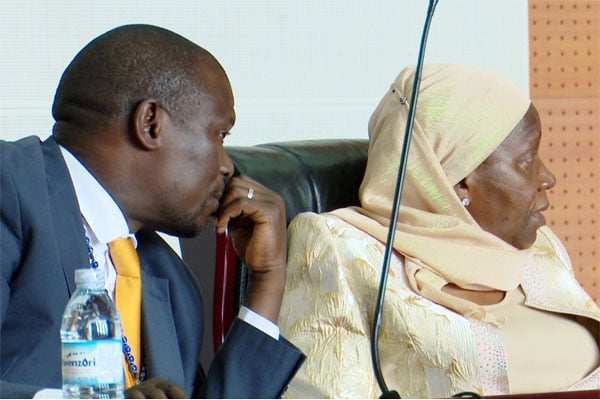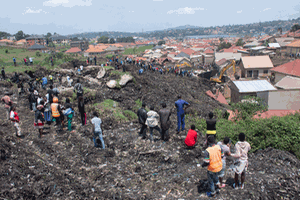
Ms Minsa Kabanda, the minister for Kampala and Metropolitan Affairs (right) and her junior Kabuye Kyofatogabye at a recent function. PHOTO | JOCYLYNNE NAKIBUULE
Between September 20 and 22, a five-man delegation from Uganda visited various waste management facilities in Ghana.
The visit, initiated by Prime Minister Robinah Nabbanja after the Kiteezi landfill disaster on August 10, aimed at exploring how Ghana, which generates 35,000 tonnes of waste daily, manages its waste and to identify areas for collaboration to improve Uganda's waste management sector.
The delegation was led by the State Minister for Kampala and Metropolitan Affairs, Mr Kabuye Kyofatogabye, and included former KCCA Deputy Executive Director David Luyimbazi, former KCCA Public Health Director Daniel Okello, Principal Economist from the Ministry of Finance Moses Ssonko, and Energy Officer Hatimu Muyanja.
During the three-day benchmarking visit, the team met with officials from Ghana's Ministries of Sanitation and Water Resources and Finance, along with OmniBsic Bank.
They also toured several facilities involved in the waste management value chain, including Abokobi Waste Transfer Station, Accra Composting Recycling Plant (ACARP), Lavender Wastewater and Fecal Treatment Facility, Kpone landfill, a plastic recycling facility, and a tricycle assembly plant, all largely operated by Jospong Group of Companies.
Upon their return, the delegation authored a report presented to the Kampala and Metropolitan Affairs Minister, Ms Minsa Kabanda, which led to the decision to hand over the decommissioning of Kiteezi landfill to Jospong Group of Companies.
However, this decision sparked mixed reactions. Days later, the Inspector General of Government (IGG) issued a letter on October 17 directing KCCA Acting Executive Director Frank Rusa to halt the ongoing transaction with Jospong. Meanwhile, Ms Kabanda’s October 15 letter, which directed the KCCA boss to proceed with the deal, went public on Monday.
The Daily Monitor reviewed the committee's report, revealing that Ghana’s waste management is driven by the private sector, with Jospong Group playing a significant role in solid and liquid waste treatment.
Abokobi Waste Transfer Station
The Abokobi Waste Transfer Station, located in the Greater Accra Region, is operated by Jospong Group and serves as a central collection point for waste from surrounding areas, handling between 400 and 600 tonnes daily.
More than 300 tricycle transporters, each with a capacity of 0.5 to 0.7 tonnes, deliver waste to the station, charging around Shs30,000 per tonne. The facility employs more than 400 people, including transporters and has sorting facilities for plastics and metals, which are packaged for reuse.
ACARP
Accra Composting Recycling Plant (ACARP) was established in 2012 to recycle and compost organic waste, reducing landfill use and promoting environmental sustainability.
Initially processing 600 to 800 tonnes of waste daily, its capacity has since grown to 2,000 tonnes. The plant specialises in sorting organic and inorganic materials, composting organic waste, and recycling plastics and metals.
Ugandan officials toured the state-of-the-art facility, which includes composting tanks and quality control laboratories.
Kpone Landfill
The delegation also visited the decommissioned Kpone Landfill, which had operated for 15 years before closing in 2022 due to capacity shortage and a fire outbreak. The landfill holds five million tonnes of waste and is managed by the Ghana Environmental Protection Agency (EPA) for post-closure monitoring.
The site is planned for redevelopment into a recreational or industrial area. This concept was recommended for Kiteezi, which collapsed in August, killing 35 people and causing significant damage.
This publication also reviewed an October 15 letter from Ms Kabanda to Mr Rusa, in which she mentioned that Jospong Group had expressed interest in reducing the height of the Kiteezi landfill using a capping method and offering a long-term recycling solution.
She directed Mr Rusa to engage Jospong and begin community consultations around Kiteezi to prepare for the works. Mr Rusa, responding to Saturday Monitor, clarified that the landfill had not yet been handed over to Jospong, despite claims by Mr Kyofatogabye.
Following the IGG’s halt of the procurement process over alleged issues, Mr Rusa forwarded the proposed memorandum of understanding (MoU) with Jospong to the Attorney General for advice.
Ms Kabanda's directive also instructed Mr Rusa to implement the Cabinet resolution by engaging the Attorney General and preparing the MoU between KCCA and Jospong, ensuring adherence to procurement procedures. Additionally, if suitable land for a new dumping site is identified, Mr Rusa was to initiate negotiations with the landowner to start using the site for waste dumping as the process progresses.






